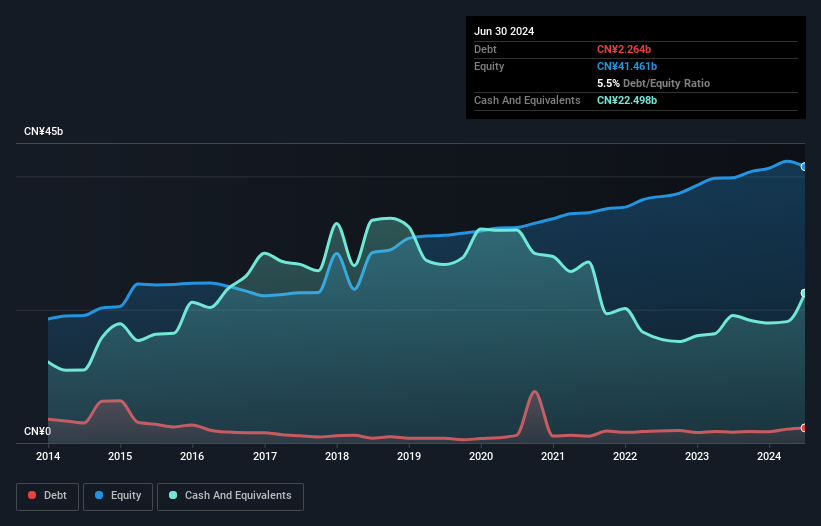
Warren Buffett famously said, 'Volatility is far from synonymous with risk.' It's only natural to consider a company's balance sheet when you examine how risky it is, since debt is often involved when a business collapses. As with many other companies Dongfang Electric Corporation Limited (HKG:1072) makes use of debt. But the more important question is: how much risk is that debt creating?
What Risk Does Debt Bring?
Debt and other liabilities become risky for a business when it cannot easily fulfill those obligations, either with free cash flow or by raising capital at an attractive price. In the worst case scenario, a company can go bankrupt if it cannot pay its creditors. However, a more common (but still painful) scenario is that it has to raise new equity capital at a low price, thus permanently diluting shareholders. Of course, debt can be an important tool in businesses, particularly capital heavy businesses. The first thing to do when considering how much debt a business uses is to look at its cash and debt together.
See our latest analysis for Dongfang Electric
How Much Debt Does Dongfang Electric Carry?
As you can see below, at the end of June 2024, Dongfang Electric had CN¥2.26b of debt, up from CN¥1.63b a year ago. Click the image for more detail. However, its balance sheet shows it holds CN¥22.5b in cash, so it actually has CN¥20.2b net cash.

How Healthy Is Dongfang Electric's Balance Sheet?
The latest balance sheet data shows that Dongfang Electric had liabilities of CN¥80.8b due within a year, and liabilities of CN¥9.31b falling due after that. Offsetting this, it had CN¥22.5b in cash and CN¥36.2b in receivables that were due within 12 months. So its liabilities outweigh the sum of its cash and (near-term) receivables by CN¥31.4b.
This is a mountain of leverage relative to its market capitalization of CN¥43.8b. This suggests shareholders would be heavily diluted if the company needed to shore up its balance sheet in a hurry. While it does have liabilities worth noting, Dongfang Electric also has more cash than debt, so we're pretty confident it can manage its debt safely.
And we also note warmly that Dongfang Electric grew its EBIT by 16% last year, making its debt load easier to handle. When analysing debt levels, the balance sheet is the obvious place to start. But ultimately the future profitability of the business will decide if Dongfang Electric can strengthen its balance sheet over time. So if you're focused on the future you can check out this free report showing analyst profit forecasts.
Finally, a company can only pay off debt with cold hard cash, not accounting profits. While Dongfang Electric has net cash on its balance sheet, it's still worth taking a look at its ability to convert earnings before interest and tax (EBIT) to free cash flow, to help us understand how quickly it is building (or eroding) that cash balance. Happily for any shareholders, Dongfang Electric actually produced more free cash flow than EBIT over the last three years. That sort of strong cash conversion gets us as excited as the crowd when the beat drops at a Daft Punk concert.
Summing Up
While Dongfang Electric does have more liabilities than liquid assets, it also has net cash of CN¥20.2b. And it impressed us with free cash flow of CN¥1.5b, being 120% of its EBIT. So we don't have any problem with Dongfang Electric's use of debt. There's no doubt that we learn most about debt from the balance sheet. However, not all investment risk resides within the balance sheet - far from it. For instance, we've identified 1 warning sign for Dongfang Electric that you should be aware of.
Of course, if you're the type of investor who prefers buying stocks without the burden of debt, then don't hesitate to discover our exclusive list of net cash growth stocks, today.
Have feedback on this article? Concerned about the content? Get in touch with us directly. Alternatively, email editorial-team (at) simplywallst.com.
This article by Simply Wall St is general in nature. We provide commentary based on historical data and analyst forecasts only using an unbiased methodology and our articles are not intended to be financial advice. It does not constitute a recommendation to buy or sell any stock, and does not take account of your objectives, or your financial situation. We aim to bring you long-term focused analysis driven by fundamental data. Note that our analysis may not factor in the latest price-sensitive company announcements or qualitative material. Simply Wall St has no position in any stocks mentioned.